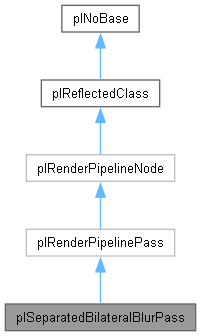Depth aware blur on input and writes it to an output buffer of the same format.
More...
|
| virtual bool | GetRenderTargetDescriptions (const plView &view, const plArrayPtr< plGALTextureCreationDescription *const > inputs, plArrayPtr< plGALTextureCreationDescription > outputs) override |
| | For a given input pin configuration, provide the output configuration of this node. Outputs is already resized to the number of output pins.
|
| |
| virtual void | Execute (const plRenderViewContext &renderViewContext, const plArrayPtr< plRenderPipelinePassConnection *const > inputs, const plArrayPtr< plRenderPipelinePassConnection *const > outputs) override |
| | Render into outputs. Both inputs and outputs are passed in with actual texture handles. Disconnected pins have a nullptr value in the passed in arrays. You can now create views and render target setups on the fly and fill the output targets with data.
|
| |
| virtual plResult | Serialize (plStreamWriter &inout_stream) const override |
| |
| virtual plResult | Deserialize (plStreamReader &inout_stream) override |
| |
|
void | SetRadius (plUInt32 uiRadius) |
| |
|
plUInt32 | GetRadius () const |
| |
|
void | SetGaussianSigma (float fSigma) |
| |
|
float | GetGaussianSigma () const |
| |
|
void | SetSharpness (float fSharpness) |
| |
|
float | GetSharpness () const |
| |
|
| plRenderPipelinePass (const char *szName, bool bIsStereoAware=false) |
| |
|
void | SetName (const char *szName) |
| | Sets the name of the pass.
|
| |
|
const char * | GetName () const |
| | returns the name of the pass.
|
| |
|
bool | IsStereoAware () const |
| | True if the render pipeline pass can handle stereo cameras correctly.
|
| |
| virtual plGALTextureHandle | QueryTextureProvider (const plRenderPipelineNodePin *pPin, const plGALTextureCreationDescription &desc) |
| |
| virtual void | InitRenderPipelinePass (const plArrayPtr< plRenderPipelinePassConnection *const > inputs, const plArrayPtr< plRenderPipelinePassConnection *const > outputs) |
| | After GetRenderTargetDescriptions was called successfully for each pass, this function is called with the inputs and outputs for review. Disconnected pins have a nullptr value in the passed in arrays. This is the time to create additional resources that are not covered by the pins automatically, e.g. a picking texture or eye adaptation buffer.
|
| |
|
virtual void | ExecuteInactive (const plRenderViewContext &renderViewContext, const plArrayPtr< plRenderPipelinePassConnection *const > inputs, const plArrayPtr< plRenderPipelinePassConnection *const > outputs) |
| |
| virtual void | ReadBackProperties (plView *pView) |
| | Allows for the pass to write data back using plView::SetRenderPassReadBackProperty. E.g. picking results etc.
|
| |
|
void | RenderDataWithCategory (const plRenderViewContext &renderViewContext, plRenderData::Category category, plRenderDataBatch::Filter filter=plRenderDataBatch::Filter()) |
| |
|
PL_ALWAYS_INLINE plRenderPipeline * | GetPipeline () |
| |
|
PL_ALWAYS_INLINE const plRenderPipeline * | GetPipeline () const |
| |
|
void | InitializePins () |
| |
|
plHashedString | GetPinName (const plRenderPipelineNodePin *pPin) const |
| |
|
const plRenderPipelineNodePin * | GetPinByName (const char *szName) const |
| |
|
const plRenderPipelineNodePin * | GetPinByName (plHashedString sName) const |
| |
|
const plArrayPtr< const plRenderPipelineNodePin *const > | GetInputPins () const |
| |
|
const plArrayPtr< const plRenderPipelineNodePin *const > | GetOutputPins () const |
| |
|
virtual const plRTTI * | GetDynamicRTTI () const |
| |
|
bool | IsInstanceOf (const plRTTI *pType) const |
| | Returns whether the type of this instance is of the given type or derived from it.
|
| |
|
template<typename T > |
| PL_ALWAYS_INLINE bool | IsInstanceOf () const |
| | Returns whether the type of this instance is of the given type or derived from it.
|
| |
Depth aware blur on input and writes it to an output buffer of the same format.
In theory it is mathematical nonsense to separate a bilateral blur, but it is common praxis and works good enough. (Thus the name "separated" in contrast to "separable")



 Public Member Functions inherited from plRenderPipelinePass
Public Member Functions inherited from plRenderPipelinePass Public Member Functions inherited from plRenderPipelineNode
Public Member Functions inherited from plRenderPipelineNode Public Member Functions inherited from plReflectedClass
Public Member Functions inherited from plReflectedClass Static Public Member Functions inherited from plNoBase
Static Public Member Functions inherited from plNoBase